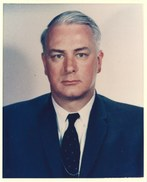Lyman Kirkpatrick
( spook, academic) | |||||||||||||||||||||||||
|---|---|---|---|---|---|---|---|---|---|---|---|---|---|---|---|---|---|---|---|---|---|---|---|---|---|
 | |||||||||||||||||||||||||
| Born | Lyman Bickford Kirkpatrick July 15, 1916 Rochester, New York, US | ||||||||||||||||||||||||
| Died | March 3, 1995 (Age 78) | ||||||||||||||||||||||||
| Alma mater | • Deerfield Academy • Princeton School of Public and International Affairs | ||||||||||||||||||||||||
| Spouse | Rita Kirkpatrick | ||||||||||||||||||||||||
| Member of | Office of Strategic Services | ||||||||||||||||||||||||
CIA Inspector General who wrote report was highly critical of Allan Dulles. Kirkpatrick would later write that he believed the report cost him "a fighting chance at the directorship."
| |||||||||||||||||||||||||
Lyman Kirkpatrick was an American spook and academic.
Career
During WW2, Lyman Kirkpatrick worked for the Office of Strategic Services. Later he joined the CIA.
Bay of pigs Report
Allen Dulles as CIA Director asked Lyman Kirkpatrick, then CIA Inspector General, to wrote a report about the Bay of Pigs invasion. The report was highly critical of Dulles, concluding that he had failed to keep Eisenhower or John F. Kennedy accurately informed. Kirkpatrick later wrote that he believed that report cost him “a fighting chance at the directorship.” Dulles destroyed all but a single copy of the report, which remained locked away until 1998, when it was declassified and released to the public. [1]
Executive Director
He was Executive Director of the Central Intelligence Agency in December 1964.[2]
Academic
In 1965, Kirkpatrick left the CIA to become a professor of political science at Brown University. In addition to lecturing and teaching, he was president of the Association of Former Intelligence Officers, and was a member of the board of directors of the Naval War College and the Defense Intelligence College.
References
- ↑ Tim Weiner, Legacy of Ashes, Penguin, 2007, p.206.
- ↑ https://history.state.gov/historicaldocuments/frus1964-68v33/d218